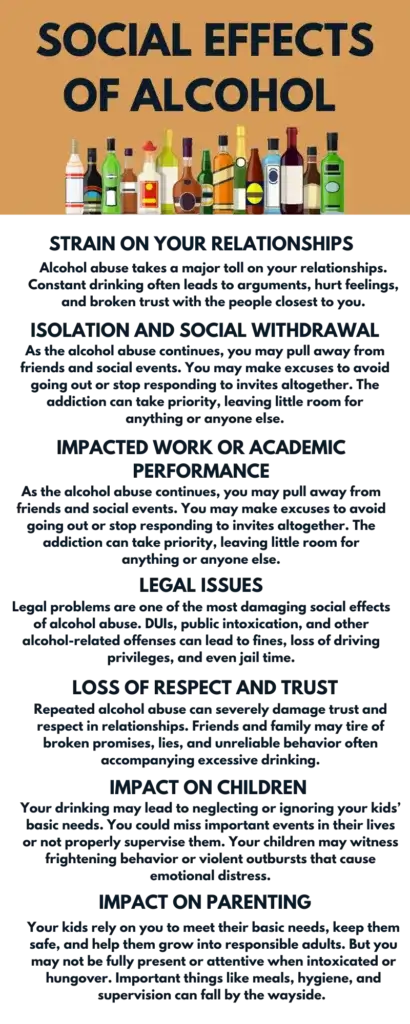You know those weekends when you wake up and can’t quite remember how you got home? Or those nights out with friends that end in tears, drama, or worse? When drinking takes over your social life, it can damage your relationships and cause serious harm.
According to studies, over 14 million adults struggle with alcohol abuse. Nearly 1 in 10 kids live with a parent who has a drinking problem. And a quarter of all adults have had at least one binge-drinking episode in the past year.
The effects go beyond health issues. Excessive alcohol use strains marriages, friendships, and families. It’s linked to domestic violence, child abuse and neglect. For college students, it disrupts studies and can lead to dropping out. At work, it results in lost productivity, accidents, and job loss.

Relationship Strain
Alcohol abuse takes a major toll on your relationships. Constant drinking often leads to arguments, hurt feelings, and broken trust with the people closest to you.
Your romantic partner may feel neglected or unloved as you prioritize drinking over quality time together. They might get fed up with broken promises to cut back and empty bottles piling up. The damage to your connection can be hard to repair.

Friendships suffer too. Buddies who used to enjoy grabbing a drink together may distance themselves from your increasingly unpredictable or obnoxious behavior. And family members can worry about your health and safety while feeling unable to help you change.
Free assessment: Does Your Loved One Have An Addiction?
Isolation and Social Withdrawal
As the alcohol abuse continues, you may pull away from friends and social events. Isolation and social withdrawal are common side effects.
You may make excuses to avoid going out or stop responding to invites altogether. Phone calls and messages from friends start to feel like a burden. Leaving the house seems difficult. Engaging in hobbies and activities you once enjoyed loses its appeal.
In time, the social circles and connections that were once a source of fulfillment and support start to fade as you cut yourself off. The addiction can take priority, leaving little room for anything or anyone else. Breaking free of this pattern can be challenging, but rebuilding your social connections and engagement with others is key to overcoming alcohol abuse and improving well-being.
Decline in Work or Academic Performance
Alcohol abuse negatively impacts your work or school performance. When you’re frequently intoxicated or hungover, it’s difficult to concentrate and accomplish tasks. You may call in sick more often due to feeling ill from drinking or being less productive when you show up.

Your work or study habits suffer since drinking becomes a higher priority. You might lose motivation and discipline. Assignments get rushed or skipped altogether. Grades start to slip, and deadlines are missed.
Coworkers and teachers notice your declining performance and reliability. They may express concern for your well-being or become frustrated with your irresponsibility. You risk damaging work relationships and career opportunities. The same goes for student-teacher relationships and letters of recommendation for college or jobs.
Legal Issues
Legal problems are one of the most damaging social effects of alcohol abuse. DUIs, public intoxication, and other alcohol-related offenses can lead to fines, loss of driving privileges, and even jail time.
Getting caught drinking and driving can result in license suspension, ignition interlock devices, and sky-high insurance rates. Multiple DUIs may lead to permanent license revocation.
Public intoxication charges for being drunk in public can also result in fines and even short-term incarceration. Over time, these alcohol-related legal issues can destroy relationships, limit career opportunities, and cause financial hardship.
Loss of Respect and Trust
Repeated alcohol abuse can severely damage trust and respect in relationships. Friends and family may tire of broken promises, lies, and unreliable behavior often accompanying excessive drinking.
Colleagues may lose confidence in the work performance and judgment of someone struggling with alcohol addiction. Promises to cut back or quit are made and quickly broken, eroding the belief that the person can change. Apologies and excuses begin to ring hollow.
Read more: Is Alcohol Considered A Drug: Effects & Addiction Rates
Negative Influence on Children
As a parent struggling with alcohol addiction, your behavior and choices can negatively impact your children in serious ways.
Your drinking may lead to neglecting or ignoring your kids’ basic needs. You could miss important events in their lives or not properly supervise them. Your children may witness frightening behavior or violent outbursts that cause emotional distress.
Over time, the instability, lack of nurturing, and traumatic experiences associated with an alcoholic parent can cause long-term psychological harm. Your children may develop anxiety, depression, low self-esteem, and problems forming healthy relationships. The effects of an alcoholic parent on a child’s well-being and development can be devastating.
Impact on Parenting
Parenting is challenging enough without the added difficulties of alcohol abuse. If you’re struggling with alcohol addiction, it can seriously impact your ability to care for your children.
Your kids rely on you to meet their basic needs, keep them safe, and help them grow into responsible adults. But you may not be fully present or attentive when intoxicated or hungover. Important things like meals, hygiene, and supervision can fall by the wayside. You may be irritable, impatient, and quick to anger, creating an unpredictable environment.

Over time, the effects on your children can be devastating. They may act out or withdraw, struggle in school, and have trouble forming healthy relationships. The damage done can continue into adulthood through the cycle of addiction and dysfunction.
Reach Out To Launch Centers Today
If you or someone you care about is struggling with alcohol abuse, don’t hesitate to reach out for help. Launch Centers offer treatment programs specifically tailored to alcohol use disorder. Their caring professionals can help you break free from addiction and start living a sober, healthy life.
Launch Centers utilize evidence-based treatments like cognitive behavioral therapy, motivational interviewing, and 12-step programs. We focus on the underlying causes of addiction and give you the skills and support to maintain long-term sobriety.
Don’t wait – take the first step towards recovery and call now. Help is absolutely within your reach. Some people want to see you succeed and have a better life ahead without relying on alcohol. Make the call that could change your life.





